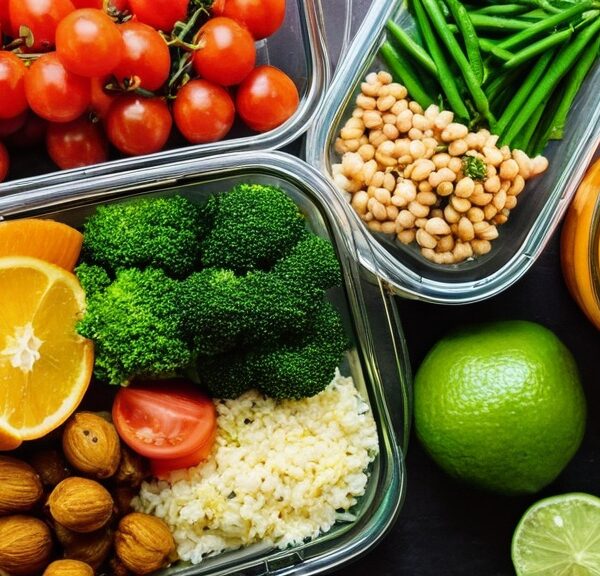Inflammation plays a crucial role in bodybuilding recovery. After intense workouts, muscles experience micro-tears, leading to inflammation. This process is natural and necessary for muscle repair and growth.
However, excessive inflammation can hinder recovery and performance. Bodybuilders must understand the balance between beneficial and harmful inflammation. While some inflammation promotes healing, chronic inflammation can lead to injuries and fatigue.
Recognizing this balance helps bodybuilders optimize their recovery strategies.
Key Takeaways
- Inflammation is a natural response to exercise, but chronic inflammation can hinder recovery and muscle growth in bodybuilders.
- Anti-inflammatory foods such as fruits, vegetables, nuts, and fatty fish can help reduce inflammation and support recovery in bodybuilders.
- Key nutrients for anti-inflammatory meal planning include omega-3 fatty acids, vitamin D, and antioxidants like vitamin C and E.
- A sample anti-inflammatory meal plan for bodybuilders may include grilled salmon, quinoa, and a mixed green salad with olive oil dressing.
- Breakfast options for anti-inflammatory meal planning can include oatmeal with berries, Greek yogurt with nuts and honey, or a smoothie with spinach and pineapple.
The Importance of Anti-Inflammatory Foods in Bodybuilding Recovery
Anti-inflammatory foods can significantly enhance recovery for bodybuilders. These foods help reduce inflammation, allowing muscles to heal faster. Incorporating them into a diet can improve overall performance and well-being.
Eating anti-inflammatory foods also supports the immune system. A strong immune system helps prevent illness, which can disrupt training schedules. By prioritizing these foods, bodybuilders can maintain their health and training consistency.
Key Nutrients for Anti-Inflammatory Meal Planning

Several key nutrients play a vital role in anti-inflammatory meal planning. Omega-3 fatty acids are among the most effective. They reduce inflammation and promote heart health, making them essential for bodybuilders.
Antioxidants also contribute to reducing inflammation. Foods rich in vitamins C and E help combat oxidative stress from intense workouts. Including these nutrients in meals can enhance recovery and overall health.
Sample Anti-Inflammatory Meal Plan for Bodybuilders in Recovery
Creating a sample anti-inflammatory meal plan can guide bodybuilders in their recovery journey. A well-rounded plan includes a variety of foods rich in essential nutrients. This diversity ensures that the body receives all necessary components for optimal recovery.
A balanced meal plan should feature whole grains, lean proteins, healthy fats, and plenty of fruits and vegetables. Each meal should aim to include anti-inflammatory ingredients to support muscle healing and overall health.
Breakfast Options for Anti-Inflammatory Meal Planning
Breakfast serves as a vital meal for bodybuilders focusing on recovery. Overnight oats topped with berries and walnuts provide a nutritious start to the day. This combination offers fiber, antioxidants, and healthy fats.
Another excellent option is a smoothie made with spinach, banana, and almond milk. Adding chia seeds boosts omega-3 content, further supporting anti-inflammatory efforts. These breakfast choices set a positive tone for the day ahead.
Lunch Ideas for Anti-Inflammatory Meal Planning

Lunch should continue the focus on anti-inflammatory foods. A quinoa salad with chickpeas, cherry tomatoes, and avocado makes a filling option. This dish combines protein, healthy fats, and fiber for sustained energy.
Another great choice is grilled salmon with steamed broccoli and sweet potatoes. Salmon provides omega-3s while sweet potatoes offer complex carbohydrates. Together, they create a balanced meal that supports recovery.
Dinner Recipes for Anti-Inflammatory Meal Planning
Dinner can be both delicious and anti-inflammatory. A stir-fry with tofu, bell peppers, and kale offers a colorful plate full of nutrients. The variety of vegetables adds antioxidants while tofu provides plant-based protein.
Alternatively, consider a hearty lentil soup with carrots and spinach. Lentils are rich in protein and fiber, promoting satiety and muscle repair. This comforting dish is perfect for winding down after a long day of training.
Snack Options for Anti-Inflammatory Meal Planning
Snacks play an essential role in maintaining energy levels throughout the day. Fresh fruit with almond butter makes a quick and nutritious option. The combination provides healthy fats and natural sugars for sustained energy.
Another great snack is Greek yogurt topped with honey and walnuts. This option offers protein, probiotics, and omega-3s, supporting gut health and recovery. Keeping healthy snacks on hand helps bodybuilders stay on track with their nutrition goals.
Hydration and Anti-Inflammatory Meal Planning
Hydration is crucial for overall health and recovery in bodybuilding. Drinking enough water helps reduce inflammation and supports muscle function. Bodybuilders should aim to stay hydrated throughout the day.
Incorporating anti-inflammatory beverages can enhance hydration efforts. Herbal teas like ginger or turmeric tea offer additional anti-inflammatory benefits. These drinks can complement a bodybuilder’s diet while promoting recovery.
Supplements to Support Anti-Inflammatory Meal Planning
Supplements can provide additional support for anti-inflammatory meal planning. Omega-3 fish oil capsules are popular among bodybuilders seeking to reduce inflammation. They offer concentrated doses of omega-3 fatty acids without needing to consume large amounts of fish.
Curcumin supplements also show promise in reducing inflammation. Derived from turmeric, curcumin has powerful anti-inflammatory properties. Bodybuilders may benefit from incorporating these supplements into their routine.
Tips for Success with Anti-Inflammatory Meal Planning for Bodybuilders in Recovery
Successful anti-inflammatory meal planning requires consistency and creativity. Bodybuilders should experiment with different recipes to keep meals exciting. Trying new ingredients can help maintain motivation while adhering to dietary goals.
Planning meals ahead of time can also streamline the process. Preparing meals in advance ensures that healthy options are readily available during busy days. This approach helps bodybuilders stay committed to their recovery nutrition plan.
In conclusion, understanding inflammation’s role in bodybuilding recovery is essential for optimal performance. Incorporating anti-inflammatory foods into meal planning can significantly enhance recovery efforts. By focusing on key nutrients, hydration, and supplements, bodybuilders can support their bodies effectively during recovery phases.
FAQs
What is an anti-inflammatory meal plan?
An anti-inflammatory meal plan focuses on consuming foods that help reduce inflammation in the body. This typically includes foods high in antioxidants, omega-3 fatty acids, and phytonutrients.
Why is an anti-inflammatory meal plan important for bodybuilders in recovery?
Bodybuilders in recovery can benefit from an anti-inflammatory meal plan as it can help reduce muscle soreness, promote faster recovery, and support overall health and well-being.
What are some examples of anti-inflammatory foods?
Examples of anti-inflammatory foods include fatty fish (such as salmon and mackerel), leafy greens, berries, nuts, seeds, turmeric, ginger, and olive oil.
Are there any foods that bodybuilders in recovery should avoid in an anti-inflammatory meal plan?
Bodybuilders in recovery may want to avoid or limit consumption of processed foods, refined sugars, trans fats, and excessive alcohol, as these can contribute to inflammation in the body.
How can bodybuilders in recovery incorporate anti-inflammatory meal planning into their diet?
Bodybuilders in recovery can incorporate anti-inflammatory meal planning by including a variety of fruits, vegetables, lean proteins, and healthy fats in their meals. They can also consider meal prepping and planning ahead to ensure they have nutritious, anti-inflammatory meals readily available.



